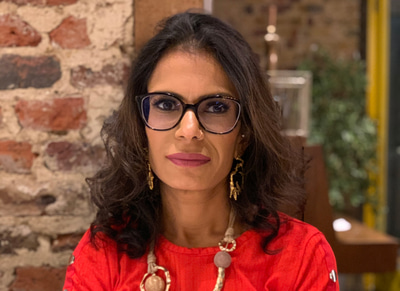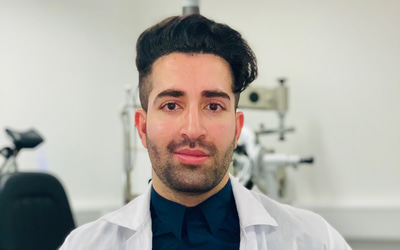- OT
- Life in practice
- Practitioner stories
- “It completely changed the dynamics of the course”
What I have learned
“It completely changed the dynamics of the course”
Lecturer at City, University of London, Dr Rakhee Shah, second year student Sabrina Choudhury, and final-year student, Bilal Hassan, share how the university responded to the changes brought about by COVID-19

29 July 2020
What impact did COVID-19 have on the optometry course and how did you adapt to deliver lectures and assessments remotely?
Dr Rakhee Shah (RS): From the week before lockdown, our university had made the decision that face-to-face teaching needed to stop and any remaining teaching, where feasible, needed to move online. I think most of the teaching had been completed for the practical elements of the course.We delivered the remaining lectures online, either providing pre-recorded PowerPoints of the lectures or live lectures over Microsoft Teams, recording them so students could catch up or listen back over the sessions.
I teach final-year clinical and professional practice and my assessments all take place in April and May. Normally I would have had objective structured clinical examinations (OSCEs) at the university, which would have accounted for 50% of the module mark, and the remaining 50% would come from a two-hour unseen exam which would have been a mixture of multiple choice, patient-based scenario questions and short-answer questions.
We were unable to run the OSCEs at the university and so we had to redesign the end of year assessment to ensure that all of the outstanding learning outcomes for the module were assessed through the final exam. I modified the exam so students could sit the two-hour paper within a 24-hour window. As it was now an open book assessment, I created a mixture of ethical scenarios and scenario-based short answer questions to ensure students weren’t regurgitating lecture materials. Instead, the aim was to see that they were able to apply their knowledge.

What have been some of the most challenging aspects of adapting the course?
RS: I think the biggest challenge has been that the situation changes so rapidly, you don’t know whether the changes you’re putting in now will be valid by the time you need to use them. When lockdown began, we had so much to do in such a short space of time and had to ensure we met the requirements of the university and professional bodies. We also had to work with the College of Optometrists to decide a course of action for those students who had outstanding competencies.My exam was due to run in four or five weeks from when lockdown was announced. I had to rewrite the exam paper and get it peer-reviewed. I then had to design an answer booklet for students, catering it to whether or not they have access to a computer or WiFi. We had to put ourselves in the students’ shoes and be very mindful of the fact that you don’t know what the students are going through with their own families.
How might teaching look in the next academic year?
RS: Considering the next academic year, I don’t think we have a choice when it comes to integrating more virtual learning. The guidance from the university at present is that anything that can be delivered online will need to be. I think there will be a split learning approach, with some lectures pre-recorded and some delivered live online.We are hoping that the majority of clinical teaching will still be done on site next year, but we will probably have a reduction in the number of students we will be teaching at any one time. Previously, groups of students would have been in at various times doing different things, but we’re trying to sync sessions so that we have two groups of students in for two weeks, and then they have two weeks out while the other groups are in. So if there is a student from one group who happens to contract coronavirus and the group needs to isolate, at least it doesn’t have as big of an impact.
Perhaps skills that require students to be further away from the patient should be taught earlier, so they are more embedded by the time students come to their later years
What are some of the key considerations you are taking into account while planning for the year ahead?
RS: We are very keen not to compromise on any aspects of the breadth of experience the students would have received in their final year whilst ensuring the module learning outcomes are achieved. For example, as part of my module, students go to Moorfields for a clinical placement. At this stage, we are unsure what is happening with that and are working with Moorfields whilst awaiting guidance on how best we can expose students to this experience.Another concern is ensuring students meet the patient episodes they need and achieve their competencies. This is something we struggled with at the end of last year because students hadn’t all finished their clinics, and it is slightly upsetting for the current third years who feel they did not get to properly finish their final year. We’re waiting for final approval from the College and the General Optical Council. We are trying very hard to keep to the plans from previous years to ensure students achieve everything they need to within their time with us.
We also have to plan for the possibility of a second wave and how we would deal with that, and we’re making sure that we do the best we can in the situation.
Has this experience presented any opportunities to adapt the course in the future?
RS: This experience has made me open to a different exam format compared to what I used previously. Interestingly, the student performance on average was the same as last year, despite the complete change in exam format.
As an optometrist, it has made me question why we don’t teach certain clinical skills earlier. We generally tend to focus on indirect ophthalmoscopy, for example, from towards the end of the second year and into the third. Going forward we are considering teaching this much earlier on, perhaps from the first year, and leaving direct ophthalmoscopy as an extension to this. Perhaps skills that require students to be further away from the patient should be taught earlier, so they are more embedded by the time students come to their later years. I don’t think this is something we would necessarily have considered if it wasn’t for this situation.
The approach to learning has completely flipped.
How did COVID-19 impact your course and how did you and your peers find the shift to online learning?

COVID-19 also delayed our final year assessments, which were pushed back by two weeks, and the end of year OSCE exam was combined into the online assessments. Initially, there was uncertainty on the exact dates and the new format of the exams. However, the university was helpful, kept us regularly informed and provided an extended deadline to complete our dissertation projects in these uncertain times.
Second-year student, Sabrina Choudhury (SC): It completely changed the dynamics of the course. As students we are very much used to physical contact with peers in clinical settings. It was evident that for some modules, such as clinical skills, it would be hard to replicate the practical labs into online learning. However, the lecturers used recorded videos to show techniques as well as the theoretical lectures we had based on these techniques.

How did the online lectures and exams compare to your usual ways of learning and methods of assessment?
BH: My peers and I felt that the cancellation of the scheduled OSCEs was not in our best interests in the long term, as these would have given us some much-needed experience for the College assessments in the pre-registration placement. We did however sit a mock OSCE back in December.
I was surprised whilst taking the first online examination. I felt slightly off-guard as to how much application there was. It was not just about recalling theory but about applying knowledge and justifying the answers. Over time the exams became easier as I adapted to the new format and way of working. I felt the style of exams was good as they were application based and real life scenarios that we may experience in our future daily lives as optometrists.
SC: The approach to learning has completely flipped. Being purely virtual, a lot of students had to tailor their revision techniques accordingly. Also, as assessments were open book, we had the luxury of looking back through our notes but we also had to ensure that we had a deep understanding of the content as the question style in the assessments had been tailored to be application-based. The benefit of this was that assessments were still challenging and the element of being ’tested’ was still very present.
Easing back into student life may be challenging and different to what are used to, so this may be hard at first but I am confident that with time, we will all settle into the new normal
What were some of the positives, and challenges, of remote learning?
SC: Online lectures could be completed at a time that was convenient for each student. We were also still able to contact lecturers with any questions and they offered us plenty of support.
However, remote learning meant communicating through email, and often explaining a concern or question is easier done in person. It was also a challenge to study whilst being at home, with so many distractions and not being in the preferred study environment. Online learning meant that we were unable to practise techniques that will be needed for our careers, so this was an obvious disadvantage. I feel like we haven’t used a retinoscope or slit lamp in a long, long time.
BH: Remote learning meant we could pause and re-watch sections of the lectures if something did not make sense to us the first time. The open book exams also tested our ability to apply our knowledge, however the format meant a lot of time was wasted in searching for information. The online teaching and exams were also dependent on your home life, such as internet connection and having access to a computer.
What are your feelings about the next academic year, following the lockdown?
SC: One of the main aspects of third year is entering CitySight clinics and having contact with real patients for the first time. Being in a pandemic, this will be a very different experience to previous years. The main concern we have is staying safe and maintaining rules and regulations.
In general, we are all trying to be as positive as we can, reassuring one another and knowing that there are many in the same position as ourselves. Easing back into student life may be challenging and different to what are used to, so this may be hard at first but I am confident that with time, we will all settle into the new normal.
How has COVID-19 affected your plans for pre-registration and how do you feel about the year ahead?
BH: I had planned to start my pre-registration with Boots Opticians in July, however this has been pushed back to January. This will mean I will qualify much later and if I start in January, my practical skills will be ‘rusty’.
I try to remain positive, but there is a constant worry that I may start pre-reg much later than January if there is a second wave. I do know of some people who have had their pre-registration placements dropped completely.
Additionally, I have fears of contracting COVID-19 as the lockdown eases, hence why it is extremely important to keep safe and wear masks to stop the spread. As guidance is changing on a weekly basis, such as being able to perform non-contact tonometry again, it is necessary that practitioners are regularly informed of what adjustments are required.


Comments (0)
You must be logged in to join the discussion. Log in